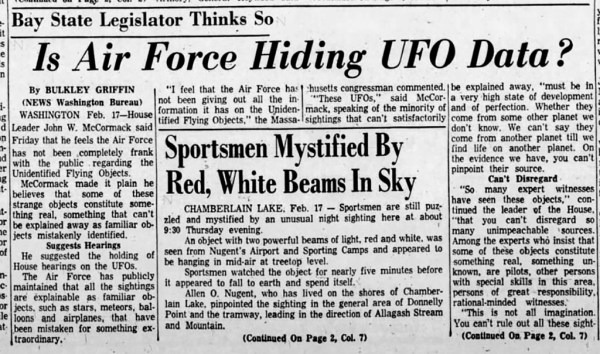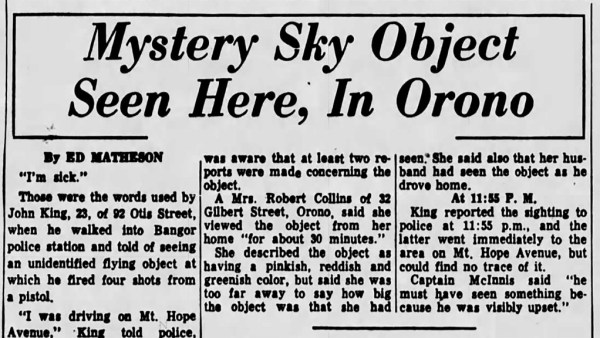Maine is a UFO hotspot, newly declassified docs say
PORTLAND, Maine — In August 2014, a man walking his dog looked up at the night sky over the city. That’s when he saw the mystery: A group of white lights, brighter than stars, traveling faster than satellites, were skimming the tree-lined horizon just behind his apartment building.
He watched as the orbs abruptly changed formation, pivoted 90 degrees and streaked away. They were gone in five seconds but his dog continued staring at the sky where the lights vanished for another half-minute.
“I have never seen anything like this and, until now, have been skeptical of UFO sightings” the man wrote in his report to the National UFO Reporting Center.
With official reports stretching back to at least 1946, Maine UFO sightings are nothing new. They’re not even rare. In the past 40 years, UFO investigators, the federal government and the Bangor Daily News recorded nearly 1,000 such reports. The latest was last month and recent data show sightings on a steady rise since 2018, with a noticeable spike during the initial pandemic lockdown. Numbers are expected to climb still higher in 2021. One analyst ranks Maine fourth in the nation in UFO visitations.
Whether you believe or not, the numbers don’t lie. Maine is a UFO report hotspot and it’s getting hotter.
Maine’s earliest unidentified flying object report in the Reporting Center archives dates to the first summer after WWII. A woman and her husband were eating lunch near the shore in South Portland when she had the overwhelming feeling of being watched. The unidentified woman then looked out into the blue, daytime sky over the sea. She saw a hovering, dark oval shape. As she laid eyes on it, it shot straight up and out of sight.
“I felt at the time, and still do now, that this was a ‘flying saucer’ and have never forgotten the incident,” she said when finally telling her story in 2008.
Over the years, online freedom of information activists at The Black Vault obtained 713 files, containing 3,493 pages, of declassified CIA documents surrounding UFO investigations and research. In 2020, they finished scanning the often badly photocopied sheets, converting them into searchable text. Now, they’re on the internet for free download.
Contained inside is a 1952 memo to the CIA director detailing a UFO sighting over Loring Air Force Base in Limestone. The sighting helped spark Project Blue Book, the government’s third and final in-depth investigation into unexplained aerial phenomena. It lasted until 1970.
The Limestone event occurred on the night of Oct. 10, 1952, from 11 p.m. until 3 a.m. Weather observers at the base saw a “circular orange object with four green lights nearby.” Their sighting instruments recorded the object at an altitude higher than any known aircraft could fly. Initial explanations indicated airmen probably saw Saturn and its moons. Later, consulting astronomer J. Allen Hynek concluded it was another planet.
“It would be an outrage to probability theory to consider the object observed was anything other than the time-honored planet Jupiter,” Hynek wrote to the CIA in a document released 50 years later. “The prosecution rests its case!”

But Hynek went on to become the most highly respected scientific UFO researcher in the country, founding the still-running Center for UFO Studies.
In the 1960s and 70s, nighttime mystery sightings were regularly reported in the Bangor Daily News. On Feb. 18, 1961, two front page headlines blared “Sportsmen Mystified By Red, White Beams In Sky,” and “Is Air Force Hiding UFO Data?”
The March 24, 1966, edition carried a story out front concerning John King, a local man who fired four .22 caliber pistol shots at a UFO in Bangor, then walked into the police station and made a report. King told police it was orange, shaped like a deflated football and he could hear it scraping across nearby bushes as it passed at low altitude.
King later told the National Investigations Committee on Aerial Phenomena that as the craft got closer, his car lights dimmed and the radio stopped playing. Police received two other reports of similar UFOs that night.
The newspaper contacted nearby Dow Air Force Base where an unidentified captain indicated he was not at liberty to either deny nor confirm that he had information related to the sightings.
One of the most infamous cases of outright alien abduction reportedly happened to four men on an Allagash River canoe trip in August 1976. One of the men later recanted but the rest have stuck to their harrowing story of enduring unpleasant extraterrestrial probing and testing.

In the 1980s and 90s, Maine UFO reports slowed down. They no longer made the news or spurred official investigations. That changed with the dawn of the digital age.
In 2000, the Reporting Center received just three sighting accounts from Maine. By 2014, that number had risen to 52 — a 1,633-percent increase.
There’s a reason for that, said Cheryl Costa, co-author of the “U.F.O. Sightings Desk Reference,” a rigorous, 371-page compendium of statistical charts and graphs analysing 121,036 sightings around the country between 2001 and 2015.
“The vast majority of sighting reports prior to 1995 were mailed in, or came via TV reports about Joe Blow seeing something on the local news,” Costa said. “By the 90s, major cities were getting broadband — and between 2003 and 2005, both major reporting organizations launched websites where you could fill out a report online.”
The other major reporting and investigating organization is the Mutual UFO Network, founded in 1969.
Costa, and her partner Linda Miller Costa, are now at work on an updated version of their book. It will include data through 2020. They hope to have it ready by spring.
The Costas are not interested in the narrative details of UFO encounters. They neither seek to prove or disprove sightings. Their analysis centers on what the detailed statistical data reveals for every state, down to the county level.
They contend UFO sightings, including those in Maine, are driven by four factors: Hours of darkness, population levels, weather and leisure time. In other words, more UFOs are reported at night, in population centers, when the weather is good and people have time to spare.
In Maine, numbers show most incidents come in the summer, in York and Cumberland Counties — where most of the state’s population lives.
As for nighttime sky-gazers killing time, Costa said, “If it wasn’t for smokers and dog walkers, we wouldn’t have 40 percent of the reports we have. The patterns are as much about human behavior as they are about UFOs.”
Another number cruncher, online science and technology writer Kristin Cooke, took population into account when looking at the Reporting Center’s sighting numbers for the first half of 2020. Looking at raw data, heavily populated states like Texas and Florida come at the top of the list. But when Cooke took into account sightings-per-100,000 residents, more sparsely populated states emerged as visitation hotspots.
In that analysis, Idaho, Montana, New Hampshire and Maine ranked one through four. New Mexico rounded out the top five.
Costa is still wrangling and analyzing her 2020 data but has already detected a large spike in reports at the time initial COVID-19 lockdowns went into place around the country in the spring.
“Numbers went through the roof,” she said. “I mean, what else did people have to do besides stream movies, sit on the deck at night and drink.”
In her detailed, 20-year national overview, Costa sees a regular — though unexplained — six to eight year cycle of up and down report numbers. Maine, and the nation, are currently three years into an upswing.
Maine-generated Reporting Center accounts rose from 26 in 2018, to 56 in 2019, to 71 in 2020.
“What’s 2021 going to look like? If the pattern holds, it’s going to escalate,” Costa said.
*** This article has been archived for your research. The original version from Bangor Daily News can be found here ***

